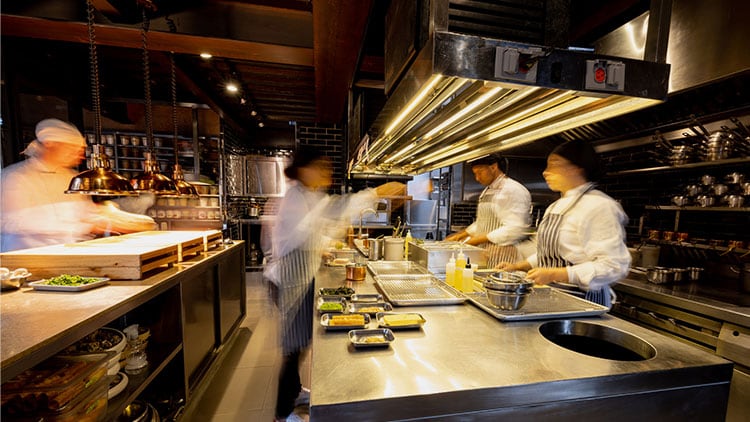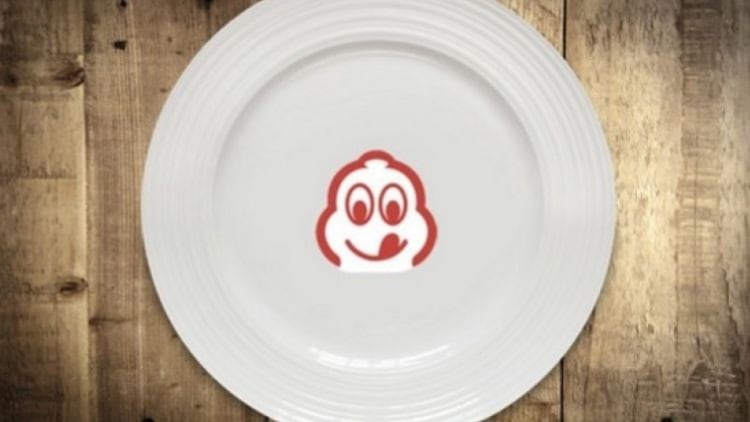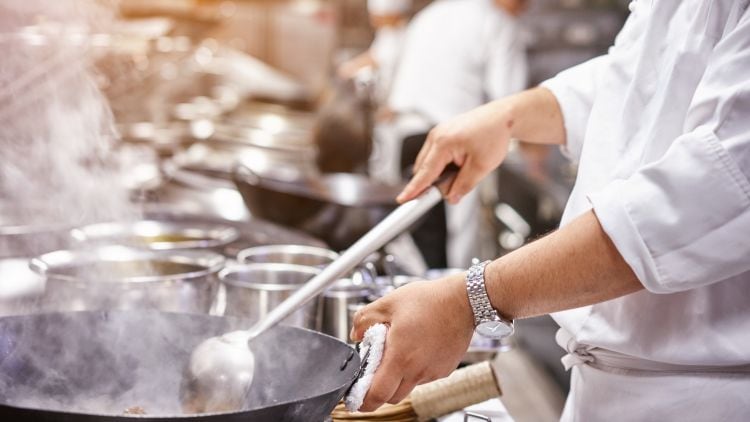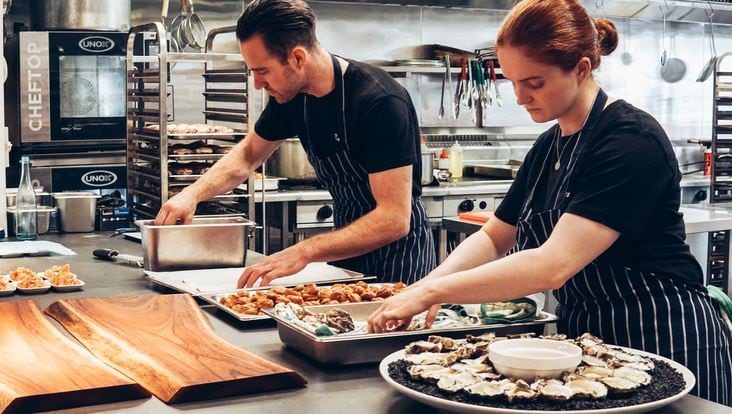All modern professional kitchens run according to a strict hierarchy, with the French Brigade system specifying the types of chefs that are part of an efficient kitchen still being widely used today to ensure the whole operation runs as smoothly as possible.
The structure will inevitably vary slightly depending on the size and style of the restaurant, however, as a chef it’s important to know and understand the many chef positions held within a professional kitchen so that you can answer the all-important question "what are the different types of chefs?"
Even if you’re not a chef, knowing what ‘sous chef’ means is a surefire way to impress your friends while watching Gordon Ramsay’s Kitchen Nightmares.
In this comprehensive guide, we will explore the different types of chefs, their titles, and the roles they play in the restaurant kitchen. In the name of logic, we’ll start from the top of the hierarchy and work our way down the chain, explaining as we go!
What are the different levels of chef?
Use the links below to jump to a specific section: Managerial Chefs | Specialist Chefs | Other Chefs & Roles
Managerial Chefs
There is a clearly established hierarchy in managerial chef positions given the level of responsibility and accountability for the restaurant's overall success.
Executive Chef (aka Group Chef)
The very top of the kitchen management structure. Only the largest establishments have an executive chef, and it is primarily a management role; executive chefs are often responsible for the operation of multiple outlets, and thus they do very little actual cooking!

Head Chef (aka Executive Chef, Chef de Cuisine)
Chef de Cuisine is the traditional French term, and although it’s slightly more common in European kitchens, head chef is the title that’s used most prevalently around the world. It takes many years of culinary education and often decades of experience within multiple positions in a professional kitchen to achieve the role of head chef.
The head chef generally controls the whole kitchen, from managing kitchen staff and controlling kitchen costs to liaising with suppliers and creating the menus.
Depending on the restaurant and the individual themselves, much like CEOs of the corporate world, the head chef will often leave much of the day-to-day running of the kitchen to individuals lower down the hierarchy, such as the sous chef.
Sous Chef (aka Second Chef, Under Chef, Assistant Chef)
The sous-chef de cuisine is second in command, and translated it literally means ‘under chef’.
The role will typically overlap with the head chef’s, but the sous chef will tend to be more hands-on and actively involved in the day-to-day running of the kitchen; the sous chef will also fill in for the head chef when they are off, as well as a chef de partie when needed.
Some smaller kitchens may not even have a sous chef, while larger operations can have more than one – there are also a few variations that can precede the title to further specify hierarchy; executive, junior or senior.
Specialist Chefs
Each specialised chef is an expert in their respective field, and as such a hierarchy generally does not exist between them.
Chef de Partie (aka Station Chef, Senior Chef)
Ever heard of the expression ‘too many cooks spoil the broth’? This is why chef de parties are a vital part of the brigade system.
Each chef de partie is responsible for running a specific section of the kitchen (we’ll cover these in more detail below) and they are usually the only worker in that station, although in some larger kitchens, each station chef may well have several assistants.
Again, this is a name that can have multiple hierarchical precedents, such as junior or senior.
Specific Chef de Partie roles include the following:
Butcher Chef (aka Boucher)
Butcher chefs specialize in utilizing various cuts of meat to create delicious meals. They are in charge of preparing meats and poultry before they are delivered to their retrospective stations, the butcher chef may also handle fish and seafood preparations.
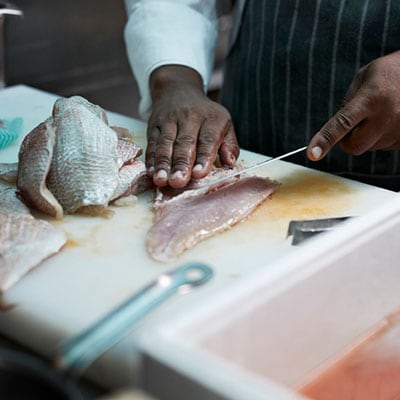
Fish Chef (aka Poissonnier)
An expert in the preparation of fish dishes, and often responsible for fish butchering as well as creating the appropriate sauces.
Fry Chef (aka Friturier)
This individual specialises in the preparation of all fried food items on the menu.
Grill Chef (aka Grillardin)
As the name implies, the master of all foods that require grilling. In smaller kitchens, this duty is fulfilled by the Rotisseur.
Pantry Chef (aka Chef Garde Manger)
A pantry chef is responsible for the preparation of cold dishes, such as salads, cold cuts and pâtés.
Pastry Chef (aka Patissier)
The King or Queen of the pastry section; baked goods, pastries and desserts are this chef's forte.
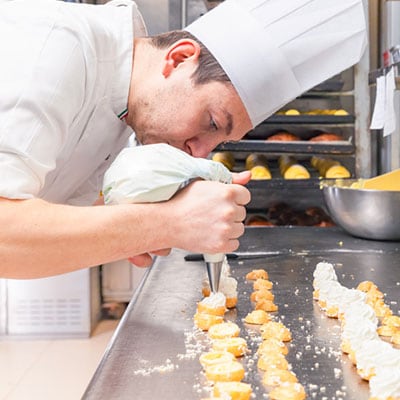
Meat Chef (aka Roast Chef, Rotisseur)
A roast chef is a type of chef that specializes in the preparation and cooking of roasting meats and vegetables, as well as the appropriate sauces.
Sauté Chef (aka Saucier, Sauce Chef)
Often the most respected role in the brigade system of stations, reporting directly to the head chef or sous-chef. They’re responsible for sautéing foods, but their most vital role lies within the creation of the sauces and gravies that will accompany other dishes.
Vegetable Chef (aka Entremetier)
Prepares vegetables, soups, starches, and eggs. Larger establishments may employ multiple chefs to work this station. A Potager would be in charge of making soups, and a Legumier would be in charge of preparing any vegetable dishes.
Other Chefs & Roles
Commis Chef (aka Line Chef, Line Cook)
A commis is a junior member of staff that works under a chef de partie in order to learn the ins and outs of a specific station, these are often people that have recently completed or are still undertaking formal culinary training such as an apprenticeship and are gaining real-world experience.
Roundsman (aka Chef de Tournant, Swing Cook, Relief Cook)
A Roundsman will fill in as needed on all of the stations, rather than having specific duties. This role comes in particularly handy when you have a station that is getting overwhelmed.
Expediter
The Expediter checks that food is perfectly presented and plated correctly before it leaves the kitchen to be served to customers. This role will usually fall to the Head Chef in a smaller kitchen, however, larger establishments will have a dedicated Expediter that ensures everything going out the door is up to par.
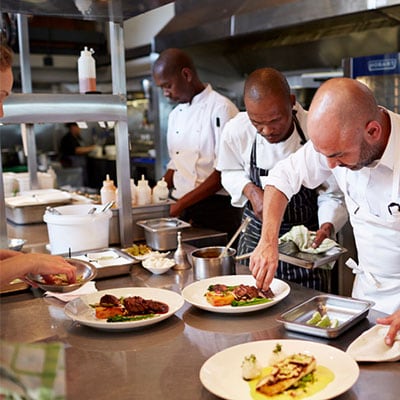
Kitchen Porter (aka Kitchen Assistant, Kitchen Hand, Prep Cook)
These are workers that assist with rudimentary tasks within the kitchen and are less likely to have any formal culinary training.
Tasks include basic food preparation such as washing salad and peeling potatoes, in addition to food labelling and basic cleaning duties.
Dishwasher (aka Escuelerie)
The person responsible for washing dishes and cutlery, and even they get a fancy title! It derives from the word ‘scullery’, which is described as a “small room adjoining a kitchen, in which dishwashing and other kitchen chores are done”
Kitchen Manager
Kitchen Managers work tirelessly behind the scenes, checking that all the required ingredients are stocked and the cooking equipment is working correctly.

